Analyzing the Development of EU Law Supremacy by the Court of Justice
VerifiedAdded on 2023/04/25
|11
|3772
|287
Essay
AI Summary
This essay provides an in-depth analysis of the development of the doctrine of supremacy of EU law by the Court of Justice (ECJ). It begins by introducing the unique legal framework of the EU and the ECJ's role as its interpreter. Key cases like Van Gend & Loos and Costa v ENEL are discussed as foundational to the establishment of EU law's supremacy over member states' domestic laws. The essay further examines how the ECJ has expanded this doctrine through cases like Community of the European Communities v Ireland and the Simmenthal case, emphasizing the absolute nature of EU law's supremacy. It also touches upon the effectiveness of this doctrine, citing the Factortame litigation in the UK. The essay concludes by highlighting the ongoing development and practical application of the EU law supremacy principle.
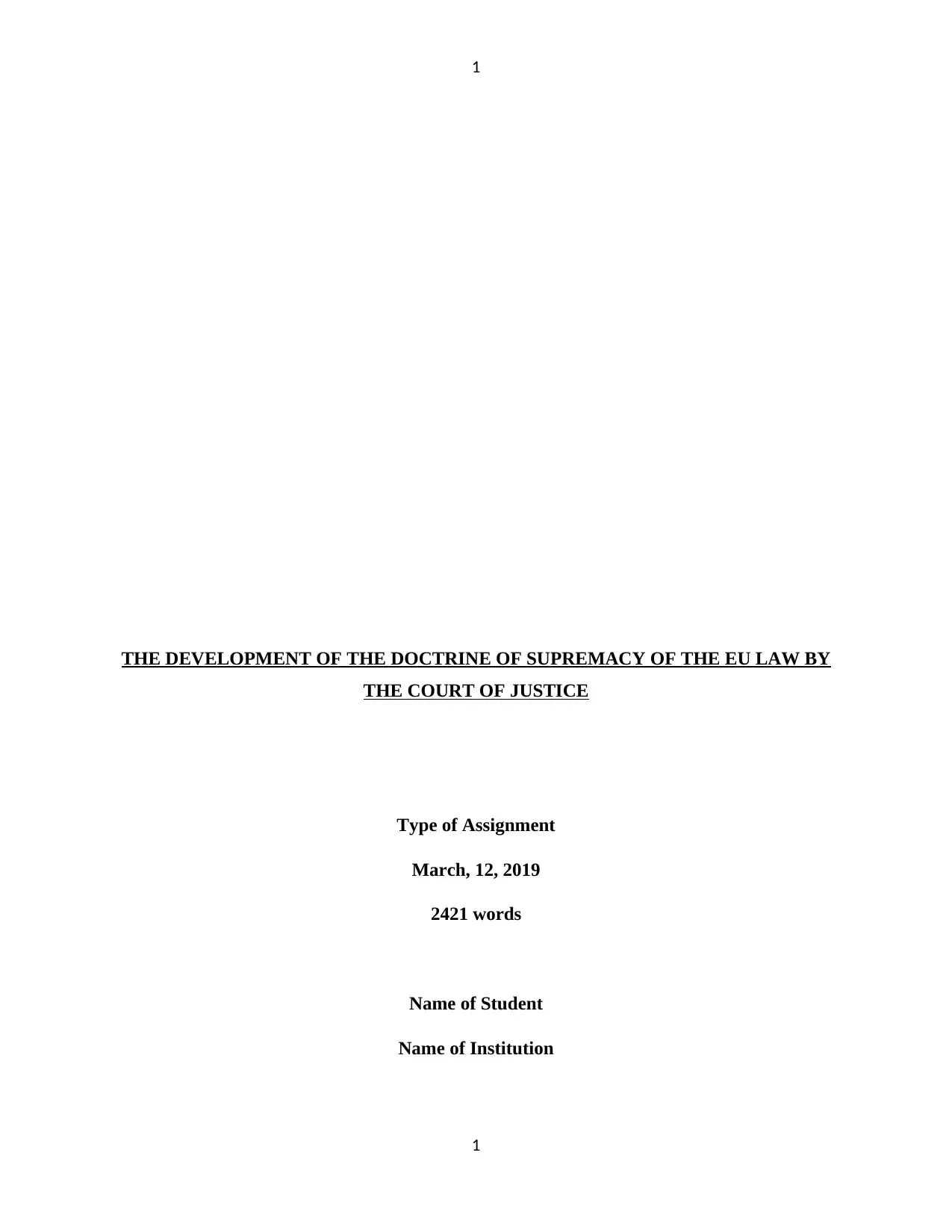
1
THE DEVELOPMENT OF THE DOCTRINE OF SUPREMACY OF THE EU LAW BY
THE COURT OF JUSTICE
Type of Assignment
March, 12, 2019
2421 words
Name of Student
Name of Institution
1
THE DEVELOPMENT OF THE DOCTRINE OF SUPREMACY OF THE EU LAW BY
THE COURT OF JUSTICE
Type of Assignment
March, 12, 2019
2421 words
Name of Student
Name of Institution
1
Paraphrase This Document
Need a fresh take? Get an instant paraphrase of this document with our AI Paraphraser
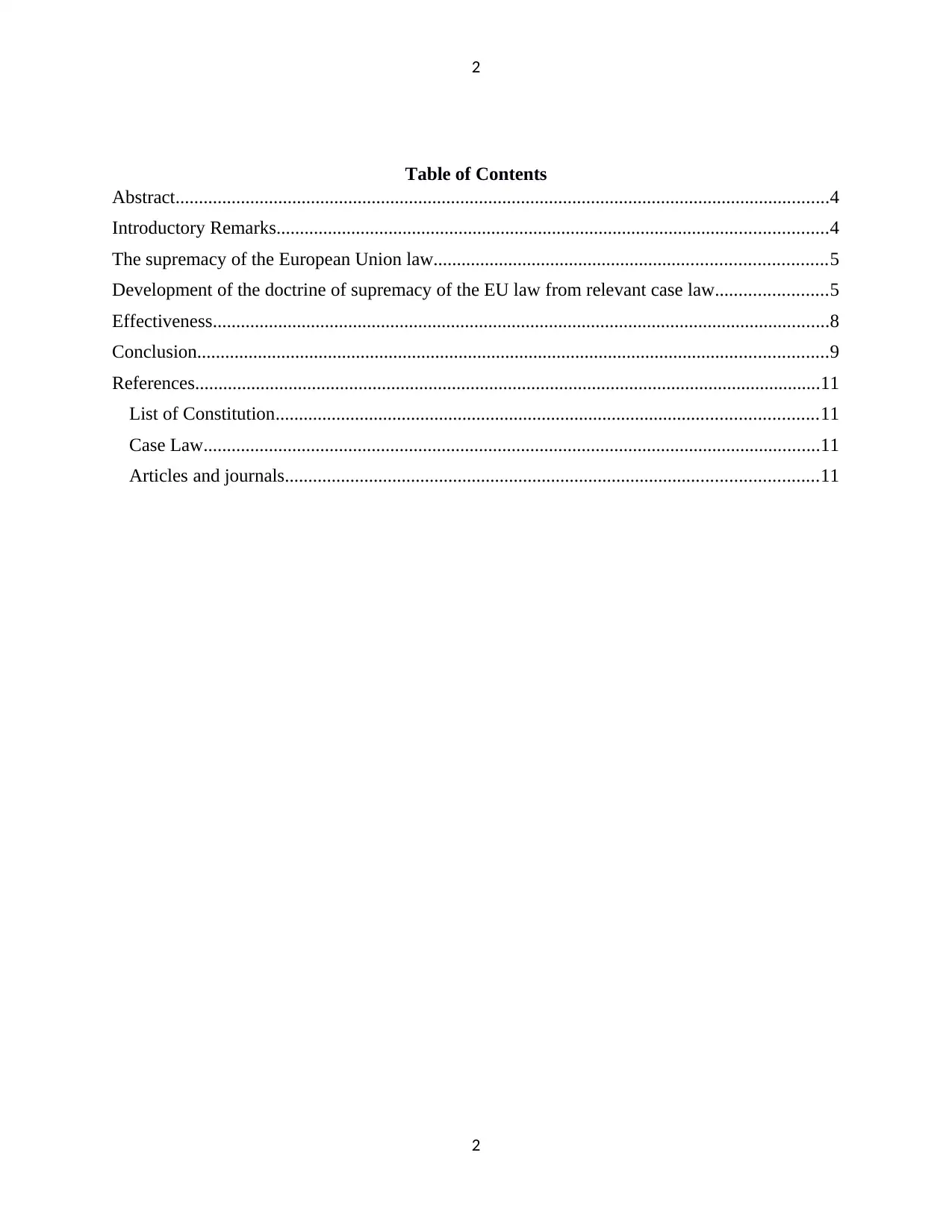
2
Table of Contents
Abstract............................................................................................................................................4
Introductory Remarks......................................................................................................................4
The supremacy of the European Union law....................................................................................5
Development of the doctrine of supremacy of the EU law from relevant case law........................5
Effectiveness....................................................................................................................................8
Conclusion.......................................................................................................................................9
References......................................................................................................................................11
List of Constitution....................................................................................................................11
Case Law....................................................................................................................................11
Articles and journals..................................................................................................................11
2
Table of Contents
Abstract............................................................................................................................................4
Introductory Remarks......................................................................................................................4
The supremacy of the European Union law....................................................................................5
Development of the doctrine of supremacy of the EU law from relevant case law........................5
Effectiveness....................................................................................................................................8
Conclusion.......................................................................................................................................9
References......................................................................................................................................11
List of Constitution....................................................................................................................11
Case Law....................................................................................................................................11
Articles and journals..................................................................................................................11
2
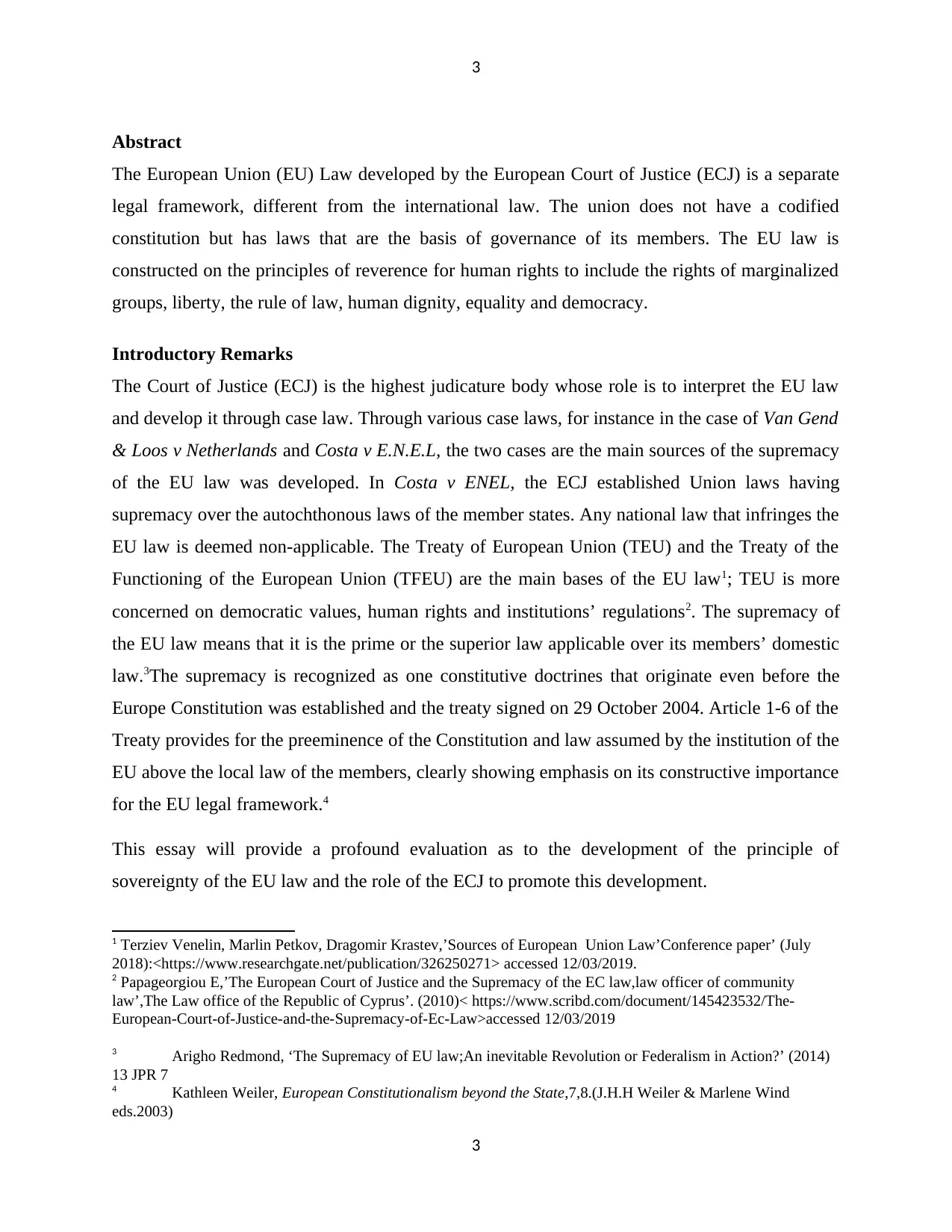
3
Abstract
The European Union (EU) Law developed by the European Court of Justice (ECJ) is a separate
legal framework, different from the international law. The union does not have a codified
constitution but has laws that are the basis of governance of its members. The EU law is
constructed on the principles of reverence for human rights to include the rights of marginalized
groups, liberty, the rule of law, human dignity, equality and democracy.
Introductory Remarks
The Court of Justice (ECJ) is the highest judicature body whose role is to interpret the EU law
and develop it through case law. Through various case laws, for instance in the case of Van Gend
& Loos v Netherlands and Costa v E.N.E.L, the two cases are the main sources of the supremacy
of the EU law was developed. In Costa v ENEL, the ECJ established Union laws having
supremacy over the autochthonous laws of the member states. Any national law that infringes the
EU law is deemed non-applicable. The Treaty of European Union (TEU) and the Treaty of the
Functioning of the European Union (TFEU) are the main bases of the EU law1; TEU is more
concerned on democratic values, human rights and institutions’ regulations2. The supremacy of
the EU law means that it is the prime or the superior law applicable over its members’ domestic
law.3The supremacy is recognized as one constitutive doctrines that originate even before the
Europe Constitution was established and the treaty signed on 29 October 2004. Article 1-6 of the
Treaty provides for the preeminence of the Constitution and law assumed by the institution of the
EU above the local law of the members, clearly showing emphasis on its constructive importance
for the EU legal framework.4
This essay will provide a profound evaluation as to the development of the principle of
sovereignty of the EU law and the role of the ECJ to promote this development.
1 Terziev Venelin, Marlin Petkov, Dragomir Krastev,’Sources of European Union Law’Conference paper’ (July
2018):<https://www.researchgate.net/publication/326250271> accessed 12/03/2019.
2 Papageorgiou E,’The European Court of Justice and the Supremacy of the EC law,law officer of community
law’,The Law office of the Republic of Cyprus’. (2010)< https://www.scribd.com/document/145423532/The-
European-Court-of-Justice-and-the-Supremacy-of-Ec-Law>accessed 12/03/2019
3 Arigho Redmond, ‘The Supremacy of EU law;An inevitable Revolution or Federalism in Action?’ (2014)
13 JPR 7
4 Kathleen Weiler, European Constitutionalism beyond the State,7,8.(J.H.H Weiler & Marlene Wind
eds.2003)
3
Abstract
The European Union (EU) Law developed by the European Court of Justice (ECJ) is a separate
legal framework, different from the international law. The union does not have a codified
constitution but has laws that are the basis of governance of its members. The EU law is
constructed on the principles of reverence for human rights to include the rights of marginalized
groups, liberty, the rule of law, human dignity, equality and democracy.
Introductory Remarks
The Court of Justice (ECJ) is the highest judicature body whose role is to interpret the EU law
and develop it through case law. Through various case laws, for instance in the case of Van Gend
& Loos v Netherlands and Costa v E.N.E.L, the two cases are the main sources of the supremacy
of the EU law was developed. In Costa v ENEL, the ECJ established Union laws having
supremacy over the autochthonous laws of the member states. Any national law that infringes the
EU law is deemed non-applicable. The Treaty of European Union (TEU) and the Treaty of the
Functioning of the European Union (TFEU) are the main bases of the EU law1; TEU is more
concerned on democratic values, human rights and institutions’ regulations2. The supremacy of
the EU law means that it is the prime or the superior law applicable over its members’ domestic
law.3The supremacy is recognized as one constitutive doctrines that originate even before the
Europe Constitution was established and the treaty signed on 29 October 2004. Article 1-6 of the
Treaty provides for the preeminence of the Constitution and law assumed by the institution of the
EU above the local law of the members, clearly showing emphasis on its constructive importance
for the EU legal framework.4
This essay will provide a profound evaluation as to the development of the principle of
sovereignty of the EU law and the role of the ECJ to promote this development.
1 Terziev Venelin, Marlin Petkov, Dragomir Krastev,’Sources of European Union Law’Conference paper’ (July
2018):<https://www.researchgate.net/publication/326250271> accessed 12/03/2019.
2 Papageorgiou E,’The European Court of Justice and the Supremacy of the EC law,law officer of community
law’,The Law office of the Republic of Cyprus’. (2010)< https://www.scribd.com/document/145423532/The-
European-Court-of-Justice-and-the-Supremacy-of-Ec-Law>accessed 12/03/2019
3 Arigho Redmond, ‘The Supremacy of EU law;An inevitable Revolution or Federalism in Action?’ (2014)
13 JPR 7
4 Kathleen Weiler, European Constitutionalism beyond the State,7,8.(J.H.H Weiler & Marlene Wind
eds.2003)
3
⊘ This is a preview!⊘
Do you want full access?
Subscribe today to unlock all pages.

Trusted by 1+ million students worldwide
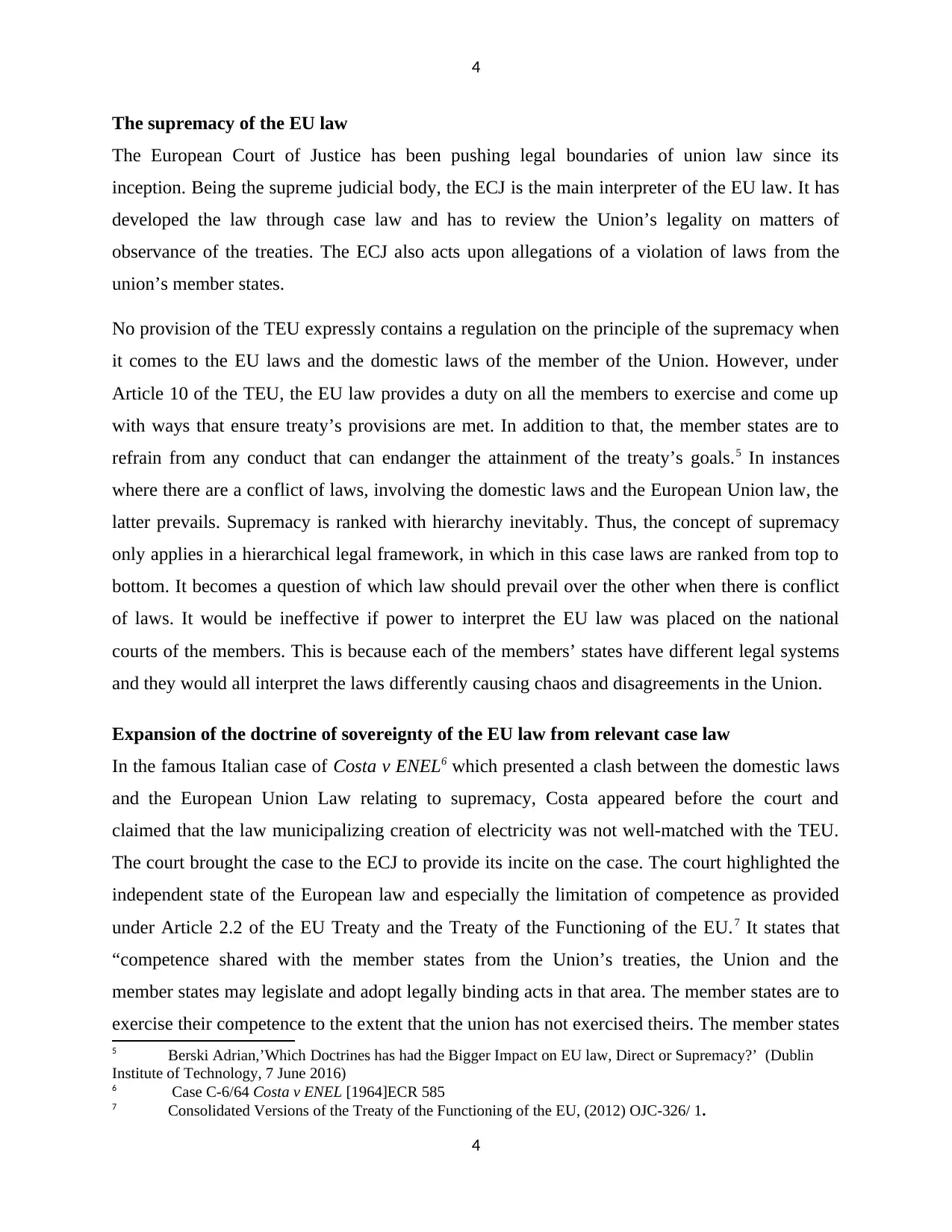
4
The supremacy of the EU law
The European Court of Justice has been pushing legal boundaries of union law since its
inception. Being the supreme judicial body, the ECJ is the main interpreter of the EU law. It has
developed the law through case law and has to review the Union’s legality on matters of
observance of the treaties. The ECJ also acts upon allegations of a violation of laws from the
union’s member states.
No provision of the TEU expressly contains a regulation on the principle of the supremacy when
it comes to the EU laws and the domestic laws of the member of the Union. However, under
Article 10 of the TEU, the EU law provides a duty on all the members to exercise and come up
with ways that ensure treaty’s provisions are met. In addition to that, the member states are to
refrain from any conduct that can endanger the attainment of the treaty’s goals.5 In instances
where there are a conflict of laws, involving the domestic laws and the European Union law, the
latter prevails. Supremacy is ranked with hierarchy inevitably. Thus, the concept of supremacy
only applies in a hierarchical legal framework, in which in this case laws are ranked from top to
bottom. It becomes a question of which law should prevail over the other when there is conflict
of laws. It would be ineffective if power to interpret the EU law was placed on the national
courts of the members. This is because each of the members’ states have different legal systems
and they would all interpret the laws differently causing chaos and disagreements in the Union.
Expansion of the doctrine of sovereignty of the EU law from relevant case law
In the famous Italian case of Costa v ENEL6 which presented a clash between the domestic laws
and the European Union Law relating to supremacy, Costa appeared before the court and
claimed that the law municipalizing creation of electricity was not well-matched with the TEU.
The court brought the case to the ECJ to provide its incite on the case. The court highlighted the
independent state of the European law and especially the limitation of competence as provided
under Article 2.2 of the EU Treaty and the Treaty of the Functioning of the EU.7 It states that
“competence shared with the member states from the Union’s treaties, the Union and the
member states may legislate and adopt legally binding acts in that area. The member states are to
exercise their competence to the extent that the union has not exercised theirs. The member states
5 Berski Adrian,’Which Doctrines has had the Bigger Impact on EU law, Direct or Supremacy?’ (Dublin
Institute of Technology, 7 June 2016)
6 Case C-6/64 Costa v ENEL [1964]ECR 585
7 Consolidated Versions of the Treaty of the Functioning of the EU, (2012) OJC-326/ 1.
4
The supremacy of the EU law
The European Court of Justice has been pushing legal boundaries of union law since its
inception. Being the supreme judicial body, the ECJ is the main interpreter of the EU law. It has
developed the law through case law and has to review the Union’s legality on matters of
observance of the treaties. The ECJ also acts upon allegations of a violation of laws from the
union’s member states.
No provision of the TEU expressly contains a regulation on the principle of the supremacy when
it comes to the EU laws and the domestic laws of the member of the Union. However, under
Article 10 of the TEU, the EU law provides a duty on all the members to exercise and come up
with ways that ensure treaty’s provisions are met. In addition to that, the member states are to
refrain from any conduct that can endanger the attainment of the treaty’s goals.5 In instances
where there are a conflict of laws, involving the domestic laws and the European Union law, the
latter prevails. Supremacy is ranked with hierarchy inevitably. Thus, the concept of supremacy
only applies in a hierarchical legal framework, in which in this case laws are ranked from top to
bottom. It becomes a question of which law should prevail over the other when there is conflict
of laws. It would be ineffective if power to interpret the EU law was placed on the national
courts of the members. This is because each of the members’ states have different legal systems
and they would all interpret the laws differently causing chaos and disagreements in the Union.
Expansion of the doctrine of sovereignty of the EU law from relevant case law
In the famous Italian case of Costa v ENEL6 which presented a clash between the domestic laws
and the European Union Law relating to supremacy, Costa appeared before the court and
claimed that the law municipalizing creation of electricity was not well-matched with the TEU.
The court brought the case to the ECJ to provide its incite on the case. The court highlighted the
independent state of the European law and especially the limitation of competence as provided
under Article 2.2 of the EU Treaty and the Treaty of the Functioning of the EU.7 It states that
“competence shared with the member states from the Union’s treaties, the Union and the
member states may legislate and adopt legally binding acts in that area. The member states are to
exercise their competence to the extent that the union has not exercised theirs. The member states
5 Berski Adrian,’Which Doctrines has had the Bigger Impact on EU law, Direct or Supremacy?’ (Dublin
Institute of Technology, 7 June 2016)
6 Case C-6/64 Costa v ENEL [1964]ECR 585
7 Consolidated Versions of the Treaty of the Functioning of the EU, (2012) OJC-326/ 1.
4
Paraphrase This Document
Need a fresh take? Get an instant paraphrase of this document with our AI Paraphraser
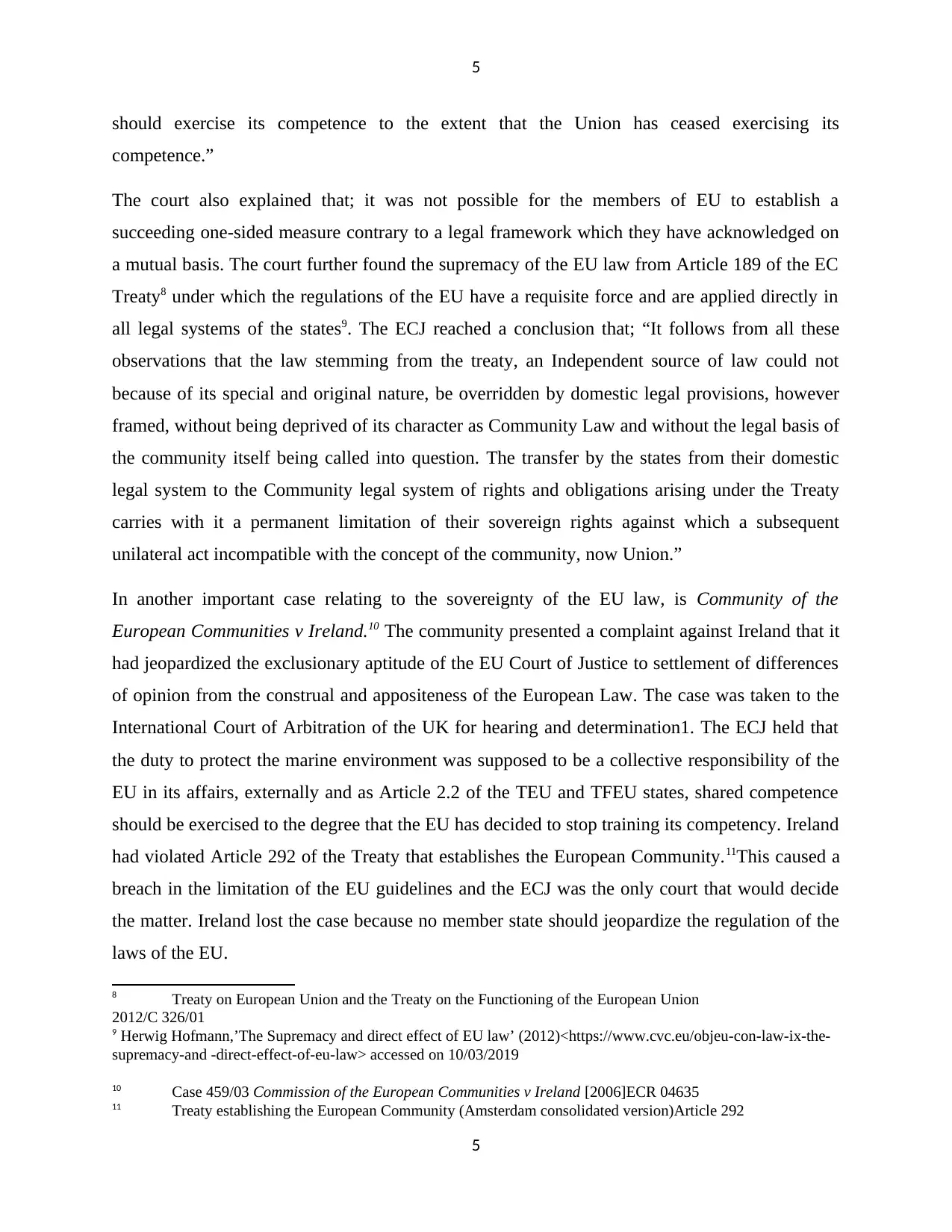
5
should exercise its competence to the extent that the Union has ceased exercising its
competence.”
The court also explained that; it was not possible for the members of EU to establish a
succeeding one-sided measure contrary to a legal framework which they have acknowledged on
a mutual basis. The court further found the supremacy of the EU law from Article 189 of the EC
Treaty8 under which the regulations of the EU have a requisite force and are applied directly in
all legal systems of the states9. The ECJ reached a conclusion that; “It follows from all these
observations that the law stemming from the treaty, an Independent source of law could not
because of its special and original nature, be overridden by domestic legal provisions, however
framed, without being deprived of its character as Community Law and without the legal basis of
the community itself being called into question. The transfer by the states from their domestic
legal system to the Community legal system of rights and obligations arising under the Treaty
carries with it a permanent limitation of their sovereign rights against which a subsequent
unilateral act incompatible with the concept of the community, now Union.”
In another important case relating to the sovereignty of the EU law, is Community of the
European Communities v Ireland.10 The community presented a complaint against Ireland that it
had jeopardized the exclusionary aptitude of the EU Court of Justice to settlement of differences
of opinion from the construal and appositeness of the European Law. The case was taken to the
International Court of Arbitration of the UK for hearing and determination1. The ECJ held that
the duty to protect the marine environment was supposed to be a collective responsibility of the
EU in its affairs, externally and as Article 2.2 of the TEU and TFEU states, shared competence
should be exercised to the degree that the EU has decided to stop training its competency. Ireland
had violated Article 292 of the Treaty that establishes the European Community.11This caused a
breach in the limitation of the EU guidelines and the ECJ was the only court that would decide
the matter. Ireland lost the case because no member state should jeopardize the regulation of the
laws of the EU.
8 Treaty on European Union and the Treaty on the Functioning of the European Union
2012/C 326/01
9 Herwig Hofmann,’The Supremacy and direct effect of EU law’ (2012)<https://www.cvc.eu/objeu-con-law-ix-the-
supremacy-and -direct-effect-of-eu-law> accessed on 10/03/2019
10 Case 459/03 Commission of the European Communities v Ireland [2006]ECR 04635
11 Treaty establishing the European Community (Amsterdam consolidated version)Article 292
5
should exercise its competence to the extent that the Union has ceased exercising its
competence.”
The court also explained that; it was not possible for the members of EU to establish a
succeeding one-sided measure contrary to a legal framework which they have acknowledged on
a mutual basis. The court further found the supremacy of the EU law from Article 189 of the EC
Treaty8 under which the regulations of the EU have a requisite force and are applied directly in
all legal systems of the states9. The ECJ reached a conclusion that; “It follows from all these
observations that the law stemming from the treaty, an Independent source of law could not
because of its special and original nature, be overridden by domestic legal provisions, however
framed, without being deprived of its character as Community Law and without the legal basis of
the community itself being called into question. The transfer by the states from their domestic
legal system to the Community legal system of rights and obligations arising under the Treaty
carries with it a permanent limitation of their sovereign rights against which a subsequent
unilateral act incompatible with the concept of the community, now Union.”
In another important case relating to the sovereignty of the EU law, is Community of the
European Communities v Ireland.10 The community presented a complaint against Ireland that it
had jeopardized the exclusionary aptitude of the EU Court of Justice to settlement of differences
of opinion from the construal and appositeness of the European Law. The case was taken to the
International Court of Arbitration of the UK for hearing and determination1. The ECJ held that
the duty to protect the marine environment was supposed to be a collective responsibility of the
EU in its affairs, externally and as Article 2.2 of the TEU and TFEU states, shared competence
should be exercised to the degree that the EU has decided to stop training its competency. Ireland
had violated Article 292 of the Treaty that establishes the European Community.11This caused a
breach in the limitation of the EU guidelines and the ECJ was the only court that would decide
the matter. Ireland lost the case because no member state should jeopardize the regulation of the
laws of the EU.
8 Treaty on European Union and the Treaty on the Functioning of the European Union
2012/C 326/01
9 Herwig Hofmann,’The Supremacy and direct effect of EU law’ (2012)<https://www.cvc.eu/objeu-con-law-ix-the-
supremacy-and -direct-effect-of-eu-law> accessed on 10/03/2019
10 Case 459/03 Commission of the European Communities v Ireland [2006]ECR 04635
11 Treaty establishing the European Community (Amsterdam consolidated version)Article 292
5
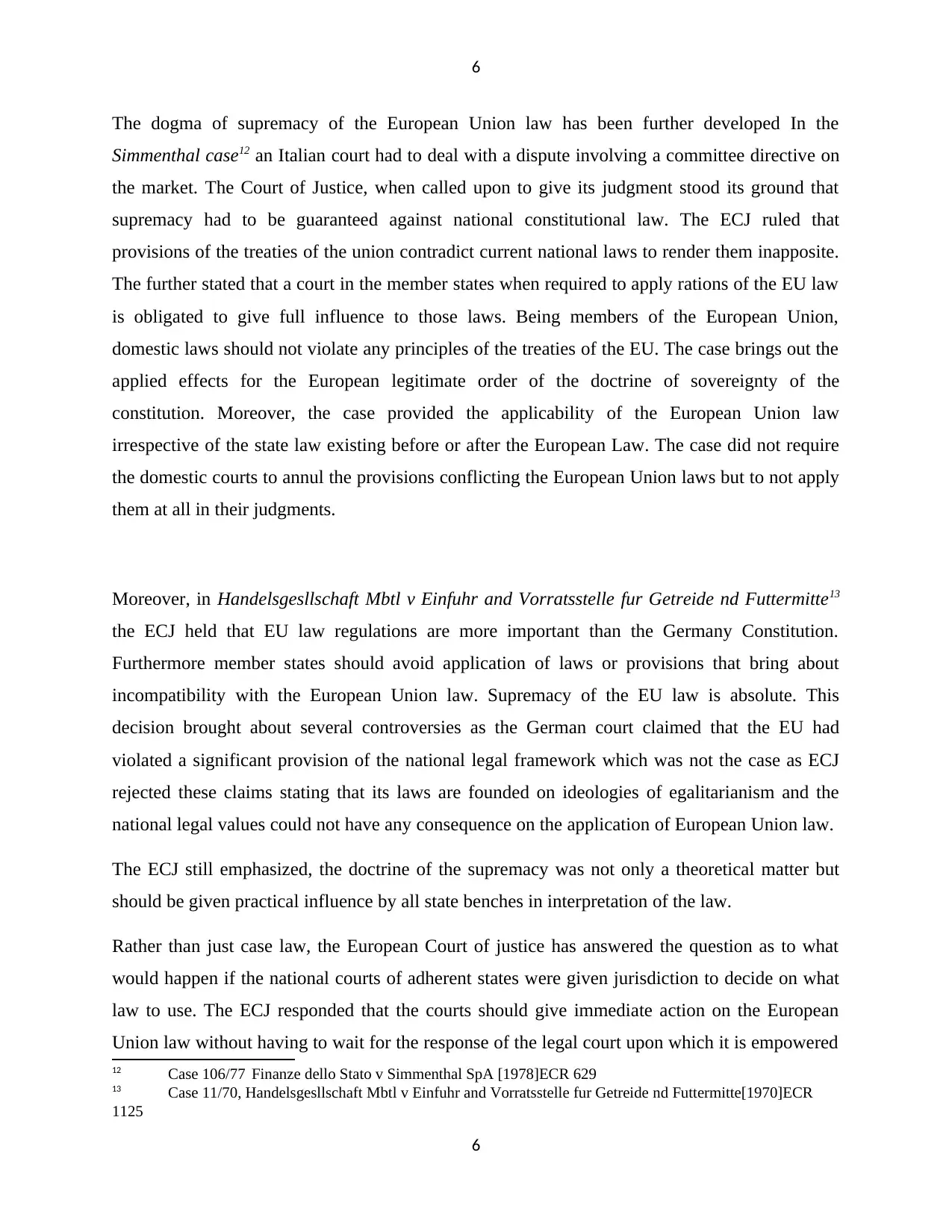
6
The dogma of supremacy of the European Union law has been further developed In the
Simmenthal case12 an Italian court had to deal with a dispute involving a committee directive on
the market. The Court of Justice, when called upon to give its judgment stood its ground that
supremacy had to be guaranteed against national constitutional law. The ECJ ruled that
provisions of the treaties of the union contradict current national laws to render them inapposite.
The further stated that a court in the member states when required to apply rations of the EU law
is obligated to give full influence to those laws. Being members of the European Union,
domestic laws should not violate any principles of the treaties of the EU. The case brings out the
applied effects for the European legitimate order of the doctrine of sovereignty of the
constitution. Moreover, the case provided the applicability of the European Union law
irrespective of the state law existing before or after the European Law. The case did not require
the domestic courts to annul the provisions conflicting the European Union laws but to not apply
them at all in their judgments.
Moreover, in Handelsgesllschaft Mbtl v Einfuhr and Vorratsstelle fur Getreide nd Futtermitte13
the ECJ held that EU law regulations are more important than the Germany Constitution.
Furthermore member states should avoid application of laws or provisions that bring about
incompatibility with the European Union law. Supremacy of the EU law is absolute. This
decision brought about several controversies as the German court claimed that the EU had
violated a significant provision of the national legal framework which was not the case as ECJ
rejected these claims stating that its laws are founded on ideologies of egalitarianism and the
national legal values could not have any consequence on the application of European Union law.
The ECJ still emphasized, the doctrine of the supremacy was not only a theoretical matter but
should be given practical influence by all state benches in interpretation of the law.
Rather than just case law, the European Court of justice has answered the question as to what
would happen if the national courts of adherent states were given jurisdiction to decide on what
law to use. The ECJ responded that the courts should give immediate action on the European
Union law without having to wait for the response of the legal court upon which it is empowered
12 Case 106/77 Finanze dello Stato v Simmenthal SpA [1978]ECR 629
13 Case 11/70, Handelsgesllschaft Mbtl v Einfuhr and Vorratsstelle fur Getreide nd Futtermitte[1970]ECR
1125
6
The dogma of supremacy of the European Union law has been further developed In the
Simmenthal case12 an Italian court had to deal with a dispute involving a committee directive on
the market. The Court of Justice, when called upon to give its judgment stood its ground that
supremacy had to be guaranteed against national constitutional law. The ECJ ruled that
provisions of the treaties of the union contradict current national laws to render them inapposite.
The further stated that a court in the member states when required to apply rations of the EU law
is obligated to give full influence to those laws. Being members of the European Union,
domestic laws should not violate any principles of the treaties of the EU. The case brings out the
applied effects for the European legitimate order of the doctrine of sovereignty of the
constitution. Moreover, the case provided the applicability of the European Union law
irrespective of the state law existing before or after the European Law. The case did not require
the domestic courts to annul the provisions conflicting the European Union laws but to not apply
them at all in their judgments.
Moreover, in Handelsgesllschaft Mbtl v Einfuhr and Vorratsstelle fur Getreide nd Futtermitte13
the ECJ held that EU law regulations are more important than the Germany Constitution.
Furthermore member states should avoid application of laws or provisions that bring about
incompatibility with the European Union law. Supremacy of the EU law is absolute. This
decision brought about several controversies as the German court claimed that the EU had
violated a significant provision of the national legal framework which was not the case as ECJ
rejected these claims stating that its laws are founded on ideologies of egalitarianism and the
national legal values could not have any consequence on the application of European Union law.
The ECJ still emphasized, the doctrine of the supremacy was not only a theoretical matter but
should be given practical influence by all state benches in interpretation of the law.
Rather than just case law, the European Court of justice has answered the question as to what
would happen if the national courts of adherent states were given jurisdiction to decide on what
law to use. The ECJ responded that the courts should give immediate action on the European
Union law without having to wait for the response of the legal court upon which it is empowered
12 Case 106/77 Finanze dello Stato v Simmenthal SpA [1978]ECR 629
13 Case 11/70, Handelsgesllschaft Mbtl v Einfuhr and Vorratsstelle fur Getreide nd Futtermitte[1970]ECR
1125
6
⊘ This is a preview!⊘
Do you want full access?
Subscribe today to unlock all pages.

Trusted by 1+ million students worldwide
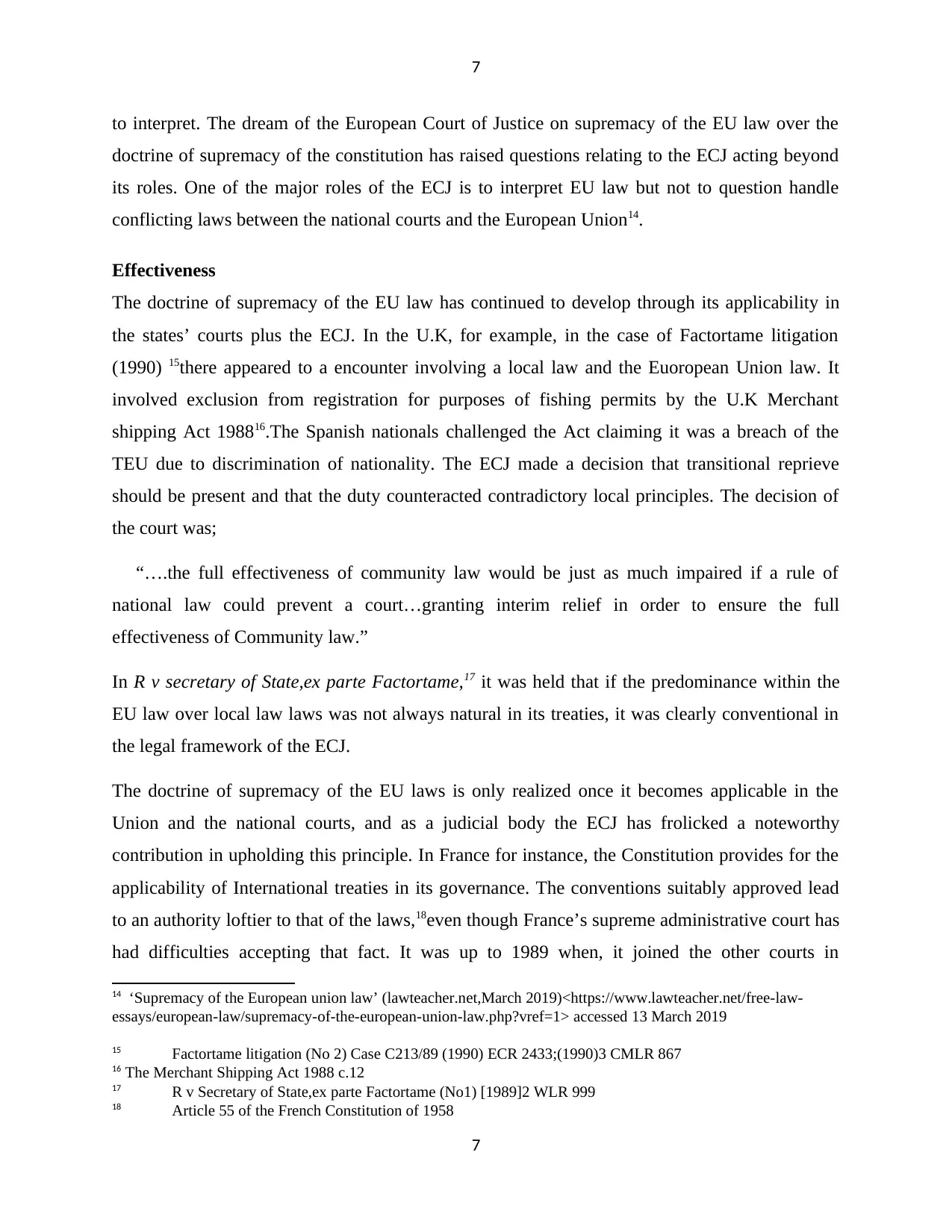
7
to interpret. The dream of the European Court of Justice on supremacy of the EU law over the
doctrine of supremacy of the constitution has raised questions relating to the ECJ acting beyond
its roles. One of the major roles of the ECJ is to interpret EU law but not to question handle
conflicting laws between the national courts and the European Union14.
Effectiveness
The doctrine of supremacy of the EU law has continued to develop through its applicability in
the states’ courts plus the ECJ. In the U.K, for example, in the case of Factortame litigation
(1990) 15there appeared to a encounter involving a local law and the Euoropean Union law. It
involved exclusion from registration for purposes of fishing permits by the U.K Merchant
shipping Act 198816.The Spanish nationals challenged the Act claiming it was a breach of the
TEU due to discrimination of nationality. The ECJ made a decision that transitional reprieve
should be present and that the duty counteracted contradictory local principles. The decision of
the court was;
“….the full effectiveness of community law would be just as much impaired if a rule of
national law could prevent a court…granting interim relief in order to ensure the full
effectiveness of Community law.”
In R v secretary of State,ex parte Factortame,17 it was held that if the predominance within the
EU law over local law laws was not always natural in its treaties, it was clearly conventional in
the legal framework of the ECJ.
The doctrine of supremacy of the EU laws is only realized once it becomes applicable in the
Union and the national courts, and as a judicial body the ECJ has frolicked a noteworthy
contribution in upholding this principle. In France for instance, the Constitution provides for the
applicability of International treaties in its governance. The conventions suitably approved lead
to an authority loftier to that of the laws,18even though France’s supreme administrative court has
had difficulties accepting that fact. It was up to 1989 when, it joined the other courts in
14 ‘Supremacy of the European union law’ (lawteacher.net,March 2019)<https://www.lawteacher.net/free-law-
essays/european-law/supremacy-of-the-european-union-law.php?vref=1> accessed 13 March 2019
15 Factortame litigation (No 2) Case C213/89 (1990) ECR 2433;(1990)3 CMLR 867
16 The Merchant Shipping Act 1988 c.12
17 R v Secretary of State,ex parte Factortame (No1) [1989]2 WLR 999
18 Article 55 of the French Constitution of 1958
7
to interpret. The dream of the European Court of Justice on supremacy of the EU law over the
doctrine of supremacy of the constitution has raised questions relating to the ECJ acting beyond
its roles. One of the major roles of the ECJ is to interpret EU law but not to question handle
conflicting laws between the national courts and the European Union14.
Effectiveness
The doctrine of supremacy of the EU law has continued to develop through its applicability in
the states’ courts plus the ECJ. In the U.K, for example, in the case of Factortame litigation
(1990) 15there appeared to a encounter involving a local law and the Euoropean Union law. It
involved exclusion from registration for purposes of fishing permits by the U.K Merchant
shipping Act 198816.The Spanish nationals challenged the Act claiming it was a breach of the
TEU due to discrimination of nationality. The ECJ made a decision that transitional reprieve
should be present and that the duty counteracted contradictory local principles. The decision of
the court was;
“….the full effectiveness of community law would be just as much impaired if a rule of
national law could prevent a court…granting interim relief in order to ensure the full
effectiveness of Community law.”
In R v secretary of State,ex parte Factortame,17 it was held that if the predominance within the
EU law over local law laws was not always natural in its treaties, it was clearly conventional in
the legal framework of the ECJ.
The doctrine of supremacy of the EU laws is only realized once it becomes applicable in the
Union and the national courts, and as a judicial body the ECJ has frolicked a noteworthy
contribution in upholding this principle. In France for instance, the Constitution provides for the
applicability of International treaties in its governance. The conventions suitably approved lead
to an authority loftier to that of the laws,18even though France’s supreme administrative court has
had difficulties accepting that fact. It was up to 1989 when, it joined the other courts in
14 ‘Supremacy of the European union law’ (lawteacher.net,March 2019)<https://www.lawteacher.net/free-law-
essays/european-law/supremacy-of-the-european-union-law.php?vref=1> accessed 13 March 2019
15 Factortame litigation (No 2) Case C213/89 (1990) ECR 2433;(1990)3 CMLR 867
16 The Merchant Shipping Act 1988 c.12
17 R v Secretary of State,ex parte Factortame (No1) [1989]2 WLR 999
18 Article 55 of the French Constitution of 1958
7
Paraphrase This Document
Need a fresh take? Get an instant paraphrase of this document with our AI Paraphraser
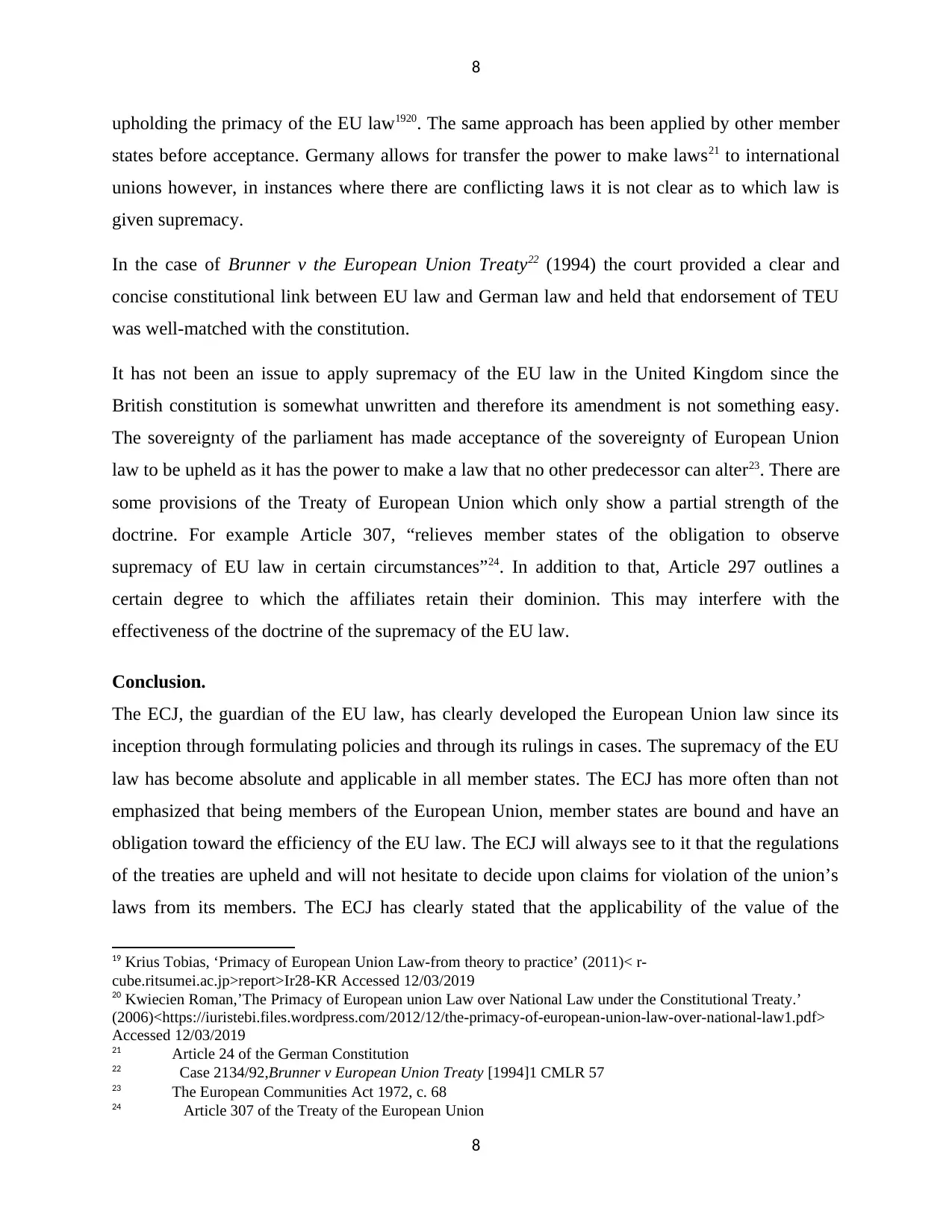
8
upholding the primacy of the EU law1920. The same approach has been applied by other member
states before acceptance. Germany allows for transfer the power to make laws21 to international
unions however, in instances where there are conflicting laws it is not clear as to which law is
given supremacy.
In the case of Brunner v the European Union Treaty22 (1994) the court provided a clear and
concise constitutional link between EU law and German law and held that endorsement of TEU
was well-matched with the constitution.
It has not been an issue to apply supremacy of the EU law in the United Kingdom since the
British constitution is somewhat unwritten and therefore its amendment is not something easy.
The sovereignty of the parliament has made acceptance of the sovereignty of European Union
law to be upheld as it has the power to make a law that no other predecessor can alter23. There are
some provisions of the Treaty of European Union which only show a partial strength of the
doctrine. For example Article 307, “relieves member states of the obligation to observe
supremacy of EU law in certain circumstances”24. In addition to that, Article 297 outlines a
certain degree to which the affiliates retain their dominion. This may interfere with the
effectiveness of the doctrine of the supremacy of the EU law.
Conclusion.
The ECJ, the guardian of the EU law, has clearly developed the European Union law since its
inception through formulating policies and through its rulings in cases. The supremacy of the EU
law has become absolute and applicable in all member states. The ECJ has more often than not
emphasized that being members of the European Union, member states are bound and have an
obligation toward the efficiency of the EU law. The ECJ will always see to it that the regulations
of the treaties are upheld and will not hesitate to decide upon claims for violation of the union’s
laws from its members. The ECJ has clearly stated that the applicability of the value of the
19 Krius Tobias, ‘Primacy of European Union Law-from theory to practice’ (2011)< r-
cube.ritsumei.ac.jp>report>Ir28-KR Accessed 12/03/2019
20 Kwiecien Roman,’The Primacy of European union Law over National Law under the Constitutional Treaty.’
(2006)<https://iuristebi.files.wordpress.com/2012/12/the-primacy-of-european-union-law-over-national-law1.pdf>
Accessed 12/03/2019
21 Article 24 of the German Constitution
22 Case 2134/92,Brunner v European Union Treaty [1994]1 CMLR 57
23 The European Communities Act 1972, c. 68
24 Article 307 of the Treaty of the European Union
8
upholding the primacy of the EU law1920. The same approach has been applied by other member
states before acceptance. Germany allows for transfer the power to make laws21 to international
unions however, in instances where there are conflicting laws it is not clear as to which law is
given supremacy.
In the case of Brunner v the European Union Treaty22 (1994) the court provided a clear and
concise constitutional link between EU law and German law and held that endorsement of TEU
was well-matched with the constitution.
It has not been an issue to apply supremacy of the EU law in the United Kingdom since the
British constitution is somewhat unwritten and therefore its amendment is not something easy.
The sovereignty of the parliament has made acceptance of the sovereignty of European Union
law to be upheld as it has the power to make a law that no other predecessor can alter23. There are
some provisions of the Treaty of European Union which only show a partial strength of the
doctrine. For example Article 307, “relieves member states of the obligation to observe
supremacy of EU law in certain circumstances”24. In addition to that, Article 297 outlines a
certain degree to which the affiliates retain their dominion. This may interfere with the
effectiveness of the doctrine of the supremacy of the EU law.
Conclusion.
The ECJ, the guardian of the EU law, has clearly developed the European Union law since its
inception through formulating policies and through its rulings in cases. The supremacy of the EU
law has become absolute and applicable in all member states. The ECJ has more often than not
emphasized that being members of the European Union, member states are bound and have an
obligation toward the efficiency of the EU law. The ECJ will always see to it that the regulations
of the treaties are upheld and will not hesitate to decide upon claims for violation of the union’s
laws from its members. The ECJ has clearly stated that the applicability of the value of the
19 Krius Tobias, ‘Primacy of European Union Law-from theory to practice’ (2011)< r-
cube.ritsumei.ac.jp>report>Ir28-KR Accessed 12/03/2019
20 Kwiecien Roman,’The Primacy of European union Law over National Law under the Constitutional Treaty.’
(2006)<https://iuristebi.files.wordpress.com/2012/12/the-primacy-of-european-union-law-over-national-law1.pdf>
Accessed 12/03/2019
21 Article 24 of the German Constitution
22 Case 2134/92,Brunner v European Union Treaty [1994]1 CMLR 57
23 The European Communities Act 1972, c. 68
24 Article 307 of the Treaty of the European Union
8
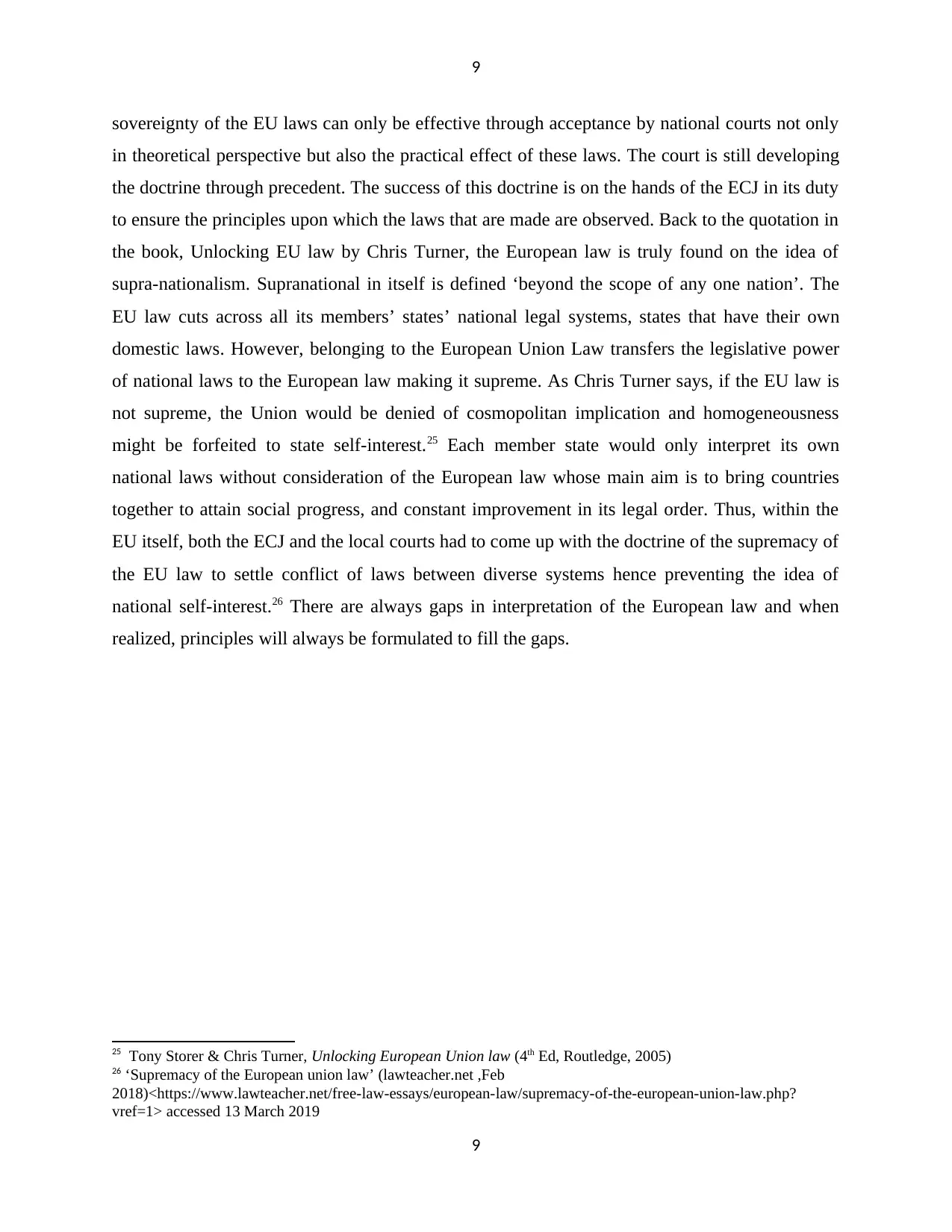
9
sovereignty of the EU laws can only be effective through acceptance by national courts not only
in theoretical perspective but also the practical effect of these laws. The court is still developing
the doctrine through precedent. The success of this doctrine is on the hands of the ECJ in its duty
to ensure the principles upon which the laws that are made are observed. Back to the quotation in
the book, Unlocking EU law by Chris Turner, the European law is truly found on the idea of
supra-nationalism. Supranational in itself is defined ‘beyond the scope of any one nation’. The
EU law cuts across all its members’ states’ national legal systems, states that have their own
domestic laws. However, belonging to the European Union Law transfers the legislative power
of national laws to the European law making it supreme. As Chris Turner says, if the EU law is
not supreme, the Union would be denied of cosmopolitan implication and homogeneousness
might be forfeited to state self-interest.25 Each member state would only interpret its own
national laws without consideration of the European law whose main aim is to bring countries
together to attain social progress, and constant improvement in its legal order. Thus, within the
EU itself, both the ECJ and the local courts had to come up with the doctrine of the supremacy of
the EU law to settle conflict of laws between diverse systems hence preventing the idea of
national self-interest.26 There are always gaps in interpretation of the European law and when
realized, principles will always be formulated to fill the gaps.
25 Tony Storer & Chris Turner, Unlocking European Union law (4th Ed, Routledge, 2005)
26 ‘Supremacy of the European union law’ (lawteacher.net ,Feb
2018)<https://www.lawteacher.net/free-law-essays/european-law/supremacy-of-the-european-union-law.php?
vref=1> accessed 13 March 2019
9
sovereignty of the EU laws can only be effective through acceptance by national courts not only
in theoretical perspective but also the practical effect of these laws. The court is still developing
the doctrine through precedent. The success of this doctrine is on the hands of the ECJ in its duty
to ensure the principles upon which the laws that are made are observed. Back to the quotation in
the book, Unlocking EU law by Chris Turner, the European law is truly found on the idea of
supra-nationalism. Supranational in itself is defined ‘beyond the scope of any one nation’. The
EU law cuts across all its members’ states’ national legal systems, states that have their own
domestic laws. However, belonging to the European Union Law transfers the legislative power
of national laws to the European law making it supreme. As Chris Turner says, if the EU law is
not supreme, the Union would be denied of cosmopolitan implication and homogeneousness
might be forfeited to state self-interest.25 Each member state would only interpret its own
national laws without consideration of the European law whose main aim is to bring countries
together to attain social progress, and constant improvement in its legal order. Thus, within the
EU itself, both the ECJ and the local courts had to come up with the doctrine of the supremacy of
the EU law to settle conflict of laws between diverse systems hence preventing the idea of
national self-interest.26 There are always gaps in interpretation of the European law and when
realized, principles will always be formulated to fill the gaps.
25 Tony Storer & Chris Turner, Unlocking European Union law (4th Ed, Routledge, 2005)
26 ‘Supremacy of the European union law’ (lawteacher.net ,Feb
2018)<https://www.lawteacher.net/free-law-essays/european-law/supremacy-of-the-european-union-law.php?
vref=1> accessed 13 March 2019
9
⊘ This is a preview!⊘
Do you want full access?
Subscribe today to unlock all pages.

Trusted by 1+ million students worldwide
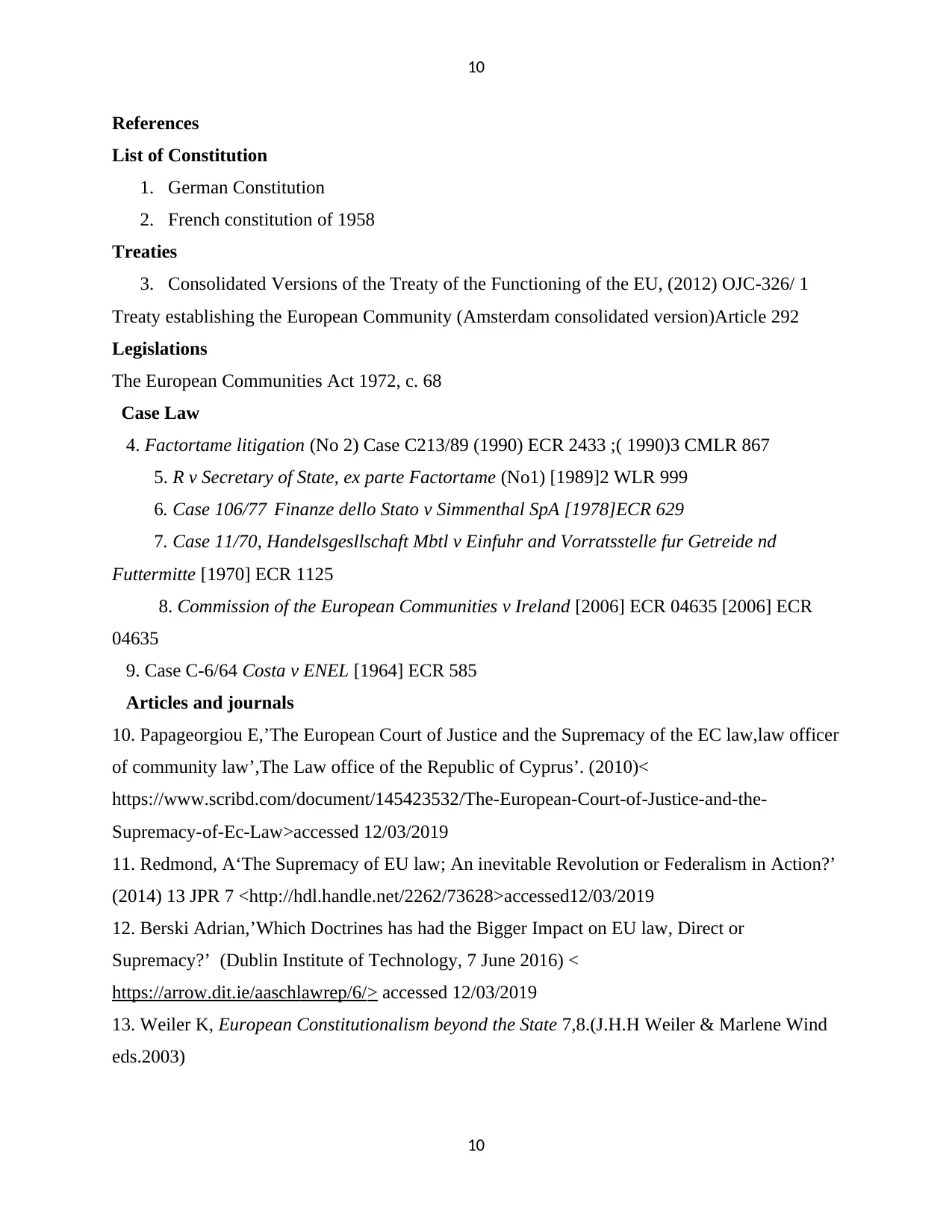
10
References
List of Constitution
1. German Constitution
2. French constitution of 1958
Treaties
3. Consolidated Versions of the Treaty of the Functioning of the EU, (2012) OJC-326/ 1
Treaty establishing the European Community (Amsterdam consolidated version)Article 292
Legislations
The European Communities Act 1972, c. 68
Case Law
4. Factortame litigation (No 2) Case C213/89 (1990) ECR 2433 ;( 1990)3 CMLR 867
5. R v Secretary of State, ex parte Factortame (No1) [1989]2 WLR 999
6. Case 106/77 Finanze dello Stato v Simmenthal SpA [1978]ECR 629
7. Case 11/70, Handelsgesllschaft Mbtl v Einfuhr and Vorratsstelle fur Getreide nd
Futtermitte [1970] ECR 1125
8. Commission of the European Communities v Ireland [2006] ECR 04635 [2006] ECR
04635
9. Case C-6/64 Costa v ENEL [1964] ECR 585
Articles and journals
10. Papageorgiou E,’The European Court of Justice and the Supremacy of the EC law,law officer
of community law’,The Law office of the Republic of Cyprus’. (2010)<
https://www.scribd.com/document/145423532/The-European-Court-of-Justice-and-the-
Supremacy-of-Ec-Law>accessed 12/03/2019
11. Redmond, A‘The Supremacy of EU law; An inevitable Revolution or Federalism in Action?’
(2014) 13 JPR 7 <http://hdl.handle.net/2262/73628>accessed12/03/2019
12. Berski Adrian,’Which Doctrines has had the Bigger Impact on EU law, Direct or
Supremacy?’ (Dublin Institute of Technology, 7 June 2016) <
https://arrow.dit.ie/aaschlawrep/6/> accessed 12/03/2019
13. Weiler K, European Constitutionalism beyond the State 7,8.(J.H.H Weiler & Marlene Wind
eds.2003)
10
References
List of Constitution
1. German Constitution
2. French constitution of 1958
Treaties
3. Consolidated Versions of the Treaty of the Functioning of the EU, (2012) OJC-326/ 1
Treaty establishing the European Community (Amsterdam consolidated version)Article 292
Legislations
The European Communities Act 1972, c. 68
Case Law
4. Factortame litigation (No 2) Case C213/89 (1990) ECR 2433 ;( 1990)3 CMLR 867
5. R v Secretary of State, ex parte Factortame (No1) [1989]2 WLR 999
6. Case 106/77 Finanze dello Stato v Simmenthal SpA [1978]ECR 629
7. Case 11/70, Handelsgesllschaft Mbtl v Einfuhr and Vorratsstelle fur Getreide nd
Futtermitte [1970] ECR 1125
8. Commission of the European Communities v Ireland [2006] ECR 04635 [2006] ECR
04635
9. Case C-6/64 Costa v ENEL [1964] ECR 585
Articles and journals
10. Papageorgiou E,’The European Court of Justice and the Supremacy of the EC law,law officer
of community law’,The Law office of the Republic of Cyprus’. (2010)<
https://www.scribd.com/document/145423532/The-European-Court-of-Justice-and-the-
Supremacy-of-Ec-Law>accessed 12/03/2019
11. Redmond, A‘The Supremacy of EU law; An inevitable Revolution or Federalism in Action?’
(2014) 13 JPR 7 <http://hdl.handle.net/2262/73628>accessed12/03/2019
12. Berski Adrian,’Which Doctrines has had the Bigger Impact on EU law, Direct or
Supremacy?’ (Dublin Institute of Technology, 7 June 2016) <
https://arrow.dit.ie/aaschlawrep/6/> accessed 12/03/2019
13. Weiler K, European Constitutionalism beyond the State 7,8.(J.H.H Weiler & Marlene Wind
eds.2003)
10
Paraphrase This Document
Need a fresh take? Get an instant paraphrase of this document with our AI Paraphraser
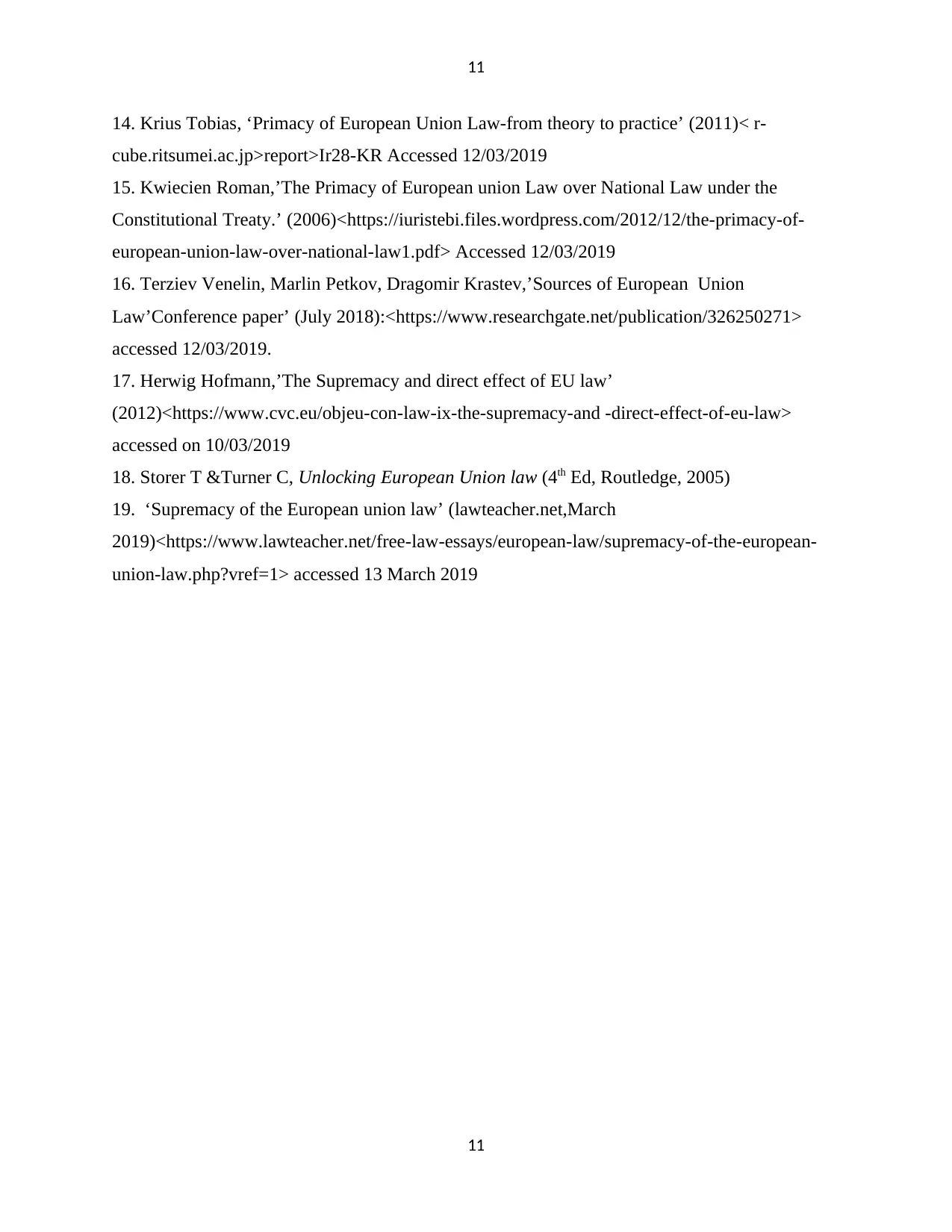
11
14. Krius Tobias, ‘Primacy of European Union Law-from theory to practice’ (2011)< r-
cube.ritsumei.ac.jp>report>Ir28-KR Accessed 12/03/2019
15. Kwiecien Roman,’The Primacy of European union Law over National Law under the
Constitutional Treaty.’ (2006)<https://iuristebi.files.wordpress.com/2012/12/the-primacy-of-
european-union-law-over-national-law1.pdf> Accessed 12/03/2019
16. Terziev Venelin, Marlin Petkov, Dragomir Krastev,’Sources of European Union
Law’Conference paper’ (July 2018):<https://www.researchgate.net/publication/326250271>
accessed 12/03/2019.
17. Herwig Hofmann,’The Supremacy and direct effect of EU law’
(2012)<https://www.cvc.eu/objeu-con-law-ix-the-supremacy-and -direct-effect-of-eu-law>
accessed on 10/03/2019
18. Storer T &Turner C, Unlocking European Union law (4th Ed, Routledge, 2005)
19. ‘Supremacy of the European union law’ (lawteacher.net,March
2019)<https://www.lawteacher.net/free-law-essays/european-law/supremacy-of-the-european-
union-law.php?vref=1> accessed 13 March 2019
11
14. Krius Tobias, ‘Primacy of European Union Law-from theory to practice’ (2011)< r-
cube.ritsumei.ac.jp>report>Ir28-KR Accessed 12/03/2019
15. Kwiecien Roman,’The Primacy of European union Law over National Law under the
Constitutional Treaty.’ (2006)<https://iuristebi.files.wordpress.com/2012/12/the-primacy-of-
european-union-law-over-national-law1.pdf> Accessed 12/03/2019
16. Terziev Venelin, Marlin Petkov, Dragomir Krastev,’Sources of European Union
Law’Conference paper’ (July 2018):<https://www.researchgate.net/publication/326250271>
accessed 12/03/2019.
17. Herwig Hofmann,’The Supremacy and direct effect of EU law’
(2012)<https://www.cvc.eu/objeu-con-law-ix-the-supremacy-and -direct-effect-of-eu-law>
accessed on 10/03/2019
18. Storer T &Turner C, Unlocking European Union law (4th Ed, Routledge, 2005)
19. ‘Supremacy of the European union law’ (lawteacher.net,March
2019)<https://www.lawteacher.net/free-law-essays/european-law/supremacy-of-the-european-
union-law.php?vref=1> accessed 13 March 2019
11
1 out of 11
Related Documents
Your All-in-One AI-Powered Toolkit for Academic Success.
+13062052269
info@desklib.com
Available 24*7 on WhatsApp / Email
![[object Object]](/_next/static/media/star-bottom.7253800d.svg)
Unlock your academic potential
Copyright © 2020–2026 A2Z Services. All Rights Reserved. Developed and managed by ZUCOL.





